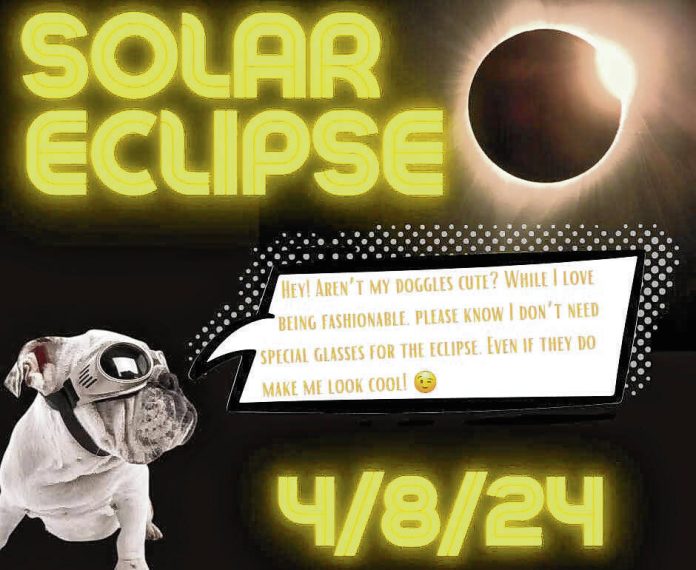
Amy Birk created this graphic for the Seymour Animal Hospital Facebook page ahead of the April 8 total solar eclipse.
While humans need to wear protective eyewear to watch the April 8 total solar eclipse, their furry friends will be fine without it.
Animals don’t purposely look at the sun as humans will be that day.
That’s the message from Seymour Animal Hospital in a recent Facebook post.
Amy Birk said she created that post after the veterinary office was bombarded with calls from pet owners during the 2017 eclipse worried about how to protect their pets from going blind.
“Thankfully, the media and local officials do such a good job letting the public know that we humans should not stare directly at the eclipse without the appropriate protective eyewear. But people love their animals, and they thought their pets would go blind. I’m not kidding, it was every other phone call,” Birk said.
She even had a farmer call and express concern about his cows going blind.
“‘Do your cows normally stare at the sun? No. Well, OK. They should be fine,’” she said, recalling the conversation. “He thought if his cows were outside in the field during the eclipse without eye protection, they would go blind. I let him know that during the eclipse, the cows would not stare at the sun, as cows don’t normally stare at the sun. But if he was worried, he could put them in the barn.”
To help ease people’s minds with the upcoming total solar eclipse, Birk had Dr. Sarah Gray share her thoughts on animals that day.
In talking to Birk about the eclipse five years ago, Gray learned most people were concerned about blindness or vision impairment with their pets.
“With the sun, if you’re just walking around and you’re not looking directly at it, you should be fine,” Gray said. “Unless you were making your dog look at the sun, there are no concerns. It’s just like any other normal day.”
Dogs and cats don’t need to wear special eyewear that day, either, even if it looks cute.
“I think people want to do something special, but it’s just like any other day,” Gray said. “As long as you’re not looking directly at (the sun), just like with us, you should be fine.”
What about livestock that are typically outside in the sun, like cows and horses?
“In general, ultraviolet radiation is a concern in any animal entirely outside, in particular lighter-colored animals, so you worry about that in lower-pigmented eyes in like horses or horses or cows that have white patches on their eyes,” Gray said. “Increased UV exposure can just increase risk for cancers.”
The same goes for white cats that are outdoors.
“They can get it on their ear tips or I had a dog that I removed a skin lesion on that ended up being cancerous because it was a white dog and it liked to belly sunbathe, and just over the years, it had gone from irritation and it’s fully tipped its way over into cancerous,” Gray said.
Just like with people, the more exposure to UV, the more risk there is of cancer.
“When they tell us to wear eye protection, even though it doesn’t hurt your eyes to look at it because it’s an eclipse, the UV radiation is still coming down and causing problems,” Gray said. “We’re more apt to look at something that can burn our retinas, but it can still be causing the same level of damage.”
With the county’s population expected to grow by three or four times during the total solar eclipse, Gray said the biggest issue will be traffic. Seymour Animal Hospital will be among the many places closed April 8 for that reason.
“It would be challenging to get anywhere in general,” she said. “Treat it like the holidays. If you need med refills (for pets), call a couple days ahead.”
If people do get out that day and take their pets with them, she said it’s important to keep the potential for heavy traffic in mind. Also, if people let their pets outside, be mindful of the increased traffic in the area.
“More travel considerations to take into account more than anything,” Gray said.
While she initially was surprised to hear the office received that many calls during the last eclipse, Gray said she understands people’s concerns about their pets because they are like family.
“The way people treat their pets has changed a lot, even from when I was at my dad’s practice,” she said. “It’s a totally different spectrum of people now that are pet owners, so I think people just think more about that stuff now than they probably used to.”
